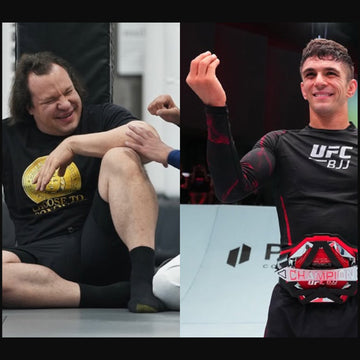The Jiu Jitsu world lit up recently when Derek Moneyberg was promoted to black belt after just three and a half years of training under Jake Shields. Some people are calling it one of the fastest promotions ever. Others are saying it goes against everything the belt is supposed to represent.
A big part of the backlash comes from Moneyberg’s limited competition history and the speed of his progression. For most practitioners, black belt is the result of a decade or more of consistent training, rolling, competing, and grinding it out on the mats. So when someone gets there in a fraction of the time, people are going to ask questions.
But not everyone is upset. Mikey Musumeci, one of the most respected names in the sport, actually came to Moneyberg’s defense and gave a different perspective:
“Derek is a genius. Super intelligent. He picks up techniques that take other people years to understand.”
According to Mikey, Moneyberg’s situation is far from typical. Most people do not have access to world champions every day. But Moneyberg reportedly trained close to 3,000 hours with private instruction from people like Mikey himself, Gordon Ryan, and other elite instructors.
“Every day, he has world champions teaching him. It is not like he is training once or twice a week. This is full-time study with the best.”
Still, a lot of people are having a hard time accepting it. ADCC veteran Vinny Magalhaes was one of the louder voices criticizing the move. He argued that black belts should still represent technical mastery, a fighting spirit, and a commitment to earning the rank through pressure-tested skill, not just access and money:
“If a DJ trained like a maniac for 3.5 years but did not pay a dime, would he still get a black belt?”
It brings up a bigger question about what a black belt means in modern Jiu Jitsu. Is it about time served, competition success, technical ability, who you train with, or some mix of all of it? And should the path be different if someone is immersed in high-level instruction around the clock?
At the end of the day, it is not just about Moneyberg. It is about how the community views belt promotions moving forward. Should there be more transparency around criteria? Or is the coach’s word final, no matter how unconventional the circumstances?
Love it or hate it, the conversation around this promotion is pushing people to reflect on what Jiu Jitsu belts should stand for in the first place.





